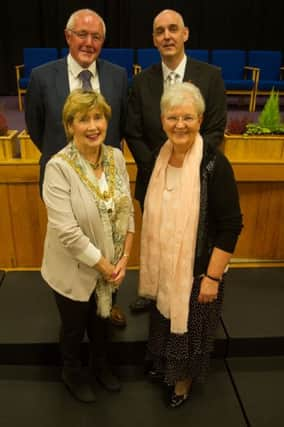SLIDESHOW: Celebrating success at Dunluce prize day


Past pupils, friends and family filled the hall as students were recognised for their hard work and success.
The guest of honour was Leonard Quigg, someone not unfamiliar with the world of education having been the headmaster of Coleraine Academical Institution from 2004-2007, the first in that school’s history to be appointed from within the ranks of the school staff.
Advertisement
Hide AdAdvertisement
Hide AdChair of the Board of Governors, Mrs Frances McCollum, hailed him as a “true son of North Antrim” as she opened proceedings. She welcomed him to a school which takes its pupils “on a holistic educational journey that will help them cope with the world outside the gates.”


“One where the young people receive the best possible education; where all staff members work hard to keep the good ship Dunluce afloat despite the inadequate budget facing all schools at present.”
She praised Principal, Philip Smyth for his hard work and enthusiasm; and for his “open door policy” which offers every pupil the opportunity to achieve the success of which they are capable.
Mr Smyth set his script aside when he reached the lecturn. He directly addressed the pupils who, having received their exam results in the summer, have moved on to new challenges. He told them that he “couldn’t believe how quickly they had grown up.” He praised the progress they had made, and the people they had become, since he had first encountered them four years previously.
Advertisement
Hide AdAdvertisement
Hide AdHe applauded the results they achieved in the summer, telling those in the audience that the school had “witnessed some truly impressive external examination results with 79.3% of students gaining at least five GCSEs, or equivalent, at grades C or above. The Northern Ireland average for non-selective schools for 5 GCSE, or equivalent, grades A* - C stands currently at 72%. I can comfortably say that we are offering a strong, pastorally rich and supportive provision and have certainly given all those, who ever questioned it, food for thought as to how much the school has progressed in recent years.”


Mr Smyth singled out subjects, such as English Literature, French, Music, Performing Arts, Business, Travel and Tourism and Engineering, which achieved a 100% pass rate, but also applauded the core subjects such as English, “A special mention this year must be given to the work of both teachers and pupils within the English Department. All credit must be given for returning the highest percentage A-C grades in the history of the school.”
He was keen to reserve the biggest praise for the pupils in front of him. “Each year I ask those assembled that they never forget their days at Dunluce, sell the good news of Dunluce, stay loyal to Dunluce and use it fruitfully as your springboard into life. What you have earned today and the prizes and cups you will collect on stage this morning are the result of honest hard work.“
When Leonard Quigg addressed the assembled crowd he chose his great uncle, Robert Quigg VC, as a role model for young people today. Rifleman Robert Quigg was awarded the Victoria Cross for actions of incredible courage during the Battle of the Somme in 1916. In a desperate attempt to find his platoon commander, Lieutenant Harry Macnaughten, Quigg spent seven hours in no man’s land.
Advertisement
Hide AdAdvertisement
Hide AdDuring this time he recovered seven wounded soldiers and brought them back to safety. Robert Quigg’s great nephew, standing on the stage in Dunluce one hundred years later, described this period as a “dark and tragic time that cast a shadow of grief over the town. But also something in which the area could take a sense of great pride. “The brave and selfless way these men answered the call to service.”
He quoted two sections from his book, ‘Robert Quigg VC: A Bushmills Hero’ that described the war hero as “a modest man from humble origins” and that “Sometimes ordinary men can do extraordinary things.”
Mr Quigg encouraged the audience to take inspiration from these statements. “We all have the potential to do brave and extraordinary things. The young people in uniform here don’t have to achieve fame on the battlefield. Now there are many areas open to them.”
“I have no doubt that one day one of you will find fame and fortune, and, like Robert Quigg, you will bring that fame back to Bushmills.”
Advertisement
Hide AdAdvertisement
Hide Ad“Robert Quigg VC remained a Causeway man throughout his life. That’s why his statue in the town is mounted on a plinth of Causeway style stones. He led a quiet, unspectacular life. He was an unassuming Bushmills lad and it was this Bushmills connection that built the bond between him and Harry Macnaughten; that led to him risking his life for seven exhausting hours searching for his boss.”
“What would we have done in a similar situation? Would we have taken that risk to rescue our boss?”
Mr Quigg stressed the importance of having a sense of duty “doing what is right in any given circumstance.” He referred to a propaganda poster created during the war featuring the local hero.
“This Ulster soldier has done his duty. Have you done yours?” Quigg talked about how, in a society dominated by rights and entitlement, we could learn a lot from his great uncle’s “selfless concern for others.”
Advertisement
Hide AdAdvertisement
Hide AdHe congratulated the students in front of him for their “excellent achievements in this fine school.
He urged them to take what they’d learned into the complex world outside before repeating the words from his book, “Ordinary men and women can do extraordinary things.”